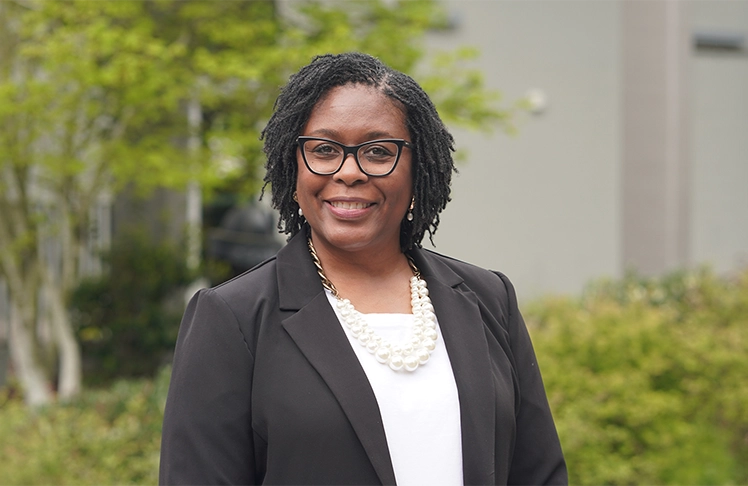Last week, The Aspen Institute College Excellence Program (Aspen) announced that Dr. Jamilyn Penn, Vice President for Student Services at Highline College, has been selected as one of their 2024-25 Aspen Rising Presidents Fellows.
With many community college presidents planning to retire in the next decade, creating an opportunity for college trustees and system heads to select leaders who have the skills and knowledge to achieve better outcomes for students. Aspen Presidential Fellows represent the next generation of leaders at the community college level in America.
“Given the impending retirements in the community college presidency, the Aspen Fellowship can play a crucial role in preparing the next generation of leaders to step into these roles with confidence and competence,” says Penn. “By investing in leadership development now, colleges can ensure a smooth transition and continuity of effective leadership in the future.”
The fellows, selected through a competitive process, will work closely with highly accomplished community college presidents, and thought leaders over ten months learning and examining demographic conditions and assessing student outcomes in their communities. This program equips participants with the skills, knowledge, and resources needed to effectively lead their institutions in a rapidly changing higher education landscape.
“I think that my proven record of effective leadership in academia played a significant role in my selection,” says Penn. “In my roles as tenured English faculty, academic and student services dean, and now vice president of student services I have demonstrated the ability to advance academic programming, lead teams, implement strategic initiatives, manage fiscal responsibilities, and drive positive and innovative change.”
“I am a huge fan of Dr. Penn, she is a brilliant, amazing, and kind human being. Her character aligns with what Aspen is looking for in a fellow to become a future president,” says Highline Community College President Dr. John Mosby. “She leads through her life experiences, can maneuver things together, and has continued to excel in setting the foundation for a strong leadership force here on our campus.”
Penn believes that her selection would not have come to fruition without the guidance and support from Mosby, who she says was intentional about supporting her to be part of the cohort group.
“My vision for the future of higher education and my ability to articulate that vision may have resonated with the goals of the Aspen Rising Presidents Fellowship,” says Penn about her selection. “Whether it is a focus on innovation, equity, student-centered learning, or community engagement, I think that my vision for the future of higher education aligns with the Fellowship’s mission of promoting principled and innovative leadership.”
Applying lessons from over a dozen years of researching exceptional community colleges, the Aspen fellowship aims to select and prepare the next generation of presidents who can lead institutions to higher and more equitable levels of student success.
“I have been involved in Aspen, as being a part of cohort 2 and doing a lot of alumni advocacy work, and it has been a great program to work with in preparing individuals to be competitive for presidencies,” says Mosby. “Aspen provides an opportunity to see higher education from a national lens and try to take it to the next level in how to be able to serve our communities in the community college system.”
The institutions that Aspen represents are all widely diverse, ranging from small rural colleges to large urban campuses. This year’s incoming class of fellows is 58 percent women and 55 percent are people of color. As a woman of color, this is very important to Penn.
“Increasing representation of women and people of color in leadership positions is not only a matter of fairness and equity but is also a means of advancing social justice and promoting greater equality in society,” says Penn. “By dismantling systemic barriers and promoting inclusive leadership practices, we can create more equitable opportunities for all individuals, regardless of gender or race. This is especially important to me.”
Joining a network of hundreds of peers, some including current college presidents, all fellows aspire to enter a college presidency within five years after the fellowship. In addition, the fellowship allows everyone to collaborate with others on how they may tackle supporting students with the obstacles they may face in college.
“The fellowship will provide access to resources, workshops, and seminars designed to enhance my leadership skills and broaden my understanding of critical issues facing society today. This will empower me to make a greater impact both in my professional endeavors and in my community,” says Penn.
Aspen has created a sense of urgency in creating and training new leaders to join college presidency roles. The fellowship is key in developing these new leaders by serving as motivation for personal and professional growth, enabling all fellows to fulfill their full potential and contribute meaningfully to society to ensure college student success.
“Being part of the Aspen Rising Presidents Fellowship signifies my commitment to ethical leadership, innovation, and positive change. It aligns me with an esteemed institution known for its dedication to fostering principled leadership and driving progress in various sectors,” says Penn. “This network can provide invaluable support, mentorship, and collaboration opportunities throughout my career, and I am dedicated to promoting student success and advancing educational equity.”
“We need solid individuals who understand themselves, their agency, and their undying commitment to student success, and Dr. Penn and Aspen epitomize those words,” says Mosby.

